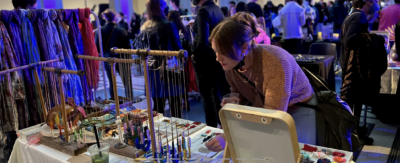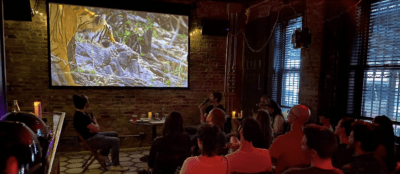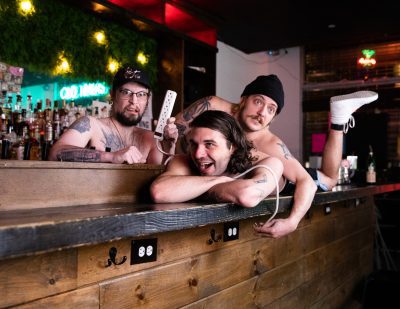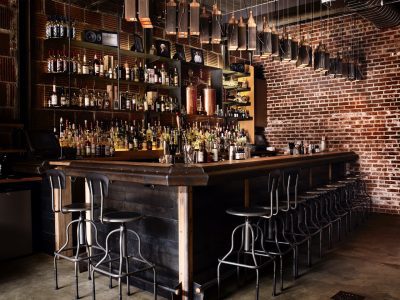Courtesy Searchlight Pictures
‘Pride and Prejudice,’ but make it gay: A chat with Joel Kim Booster
The 'Fire Island' auteur discusses his film, representation and 'Gays in Space'
It seems like there’s been an influx of queer movies and TV because there’s so much talk about them on social media. In reality, though, the first ever Hollywood movie with an all gay cast has finally just come out—to borrow the phrase.
Comedian Joel Kim Booster’s movie “Fire Island” is out now on Hulu; he wrote and stars in it with “Saturday Night Live” cast member Bowen Yang, and comedian Margaret Cho.
“Fire Island” follows Noah (Booster), a carefree Brooklynite and his anxious best friend Howie (Yang). Every summer, their group of friends visit lesbian mother figure Erin (Cho) at her house on Tuna Walk in The Pines, the part of Fire Island with the most expensive real estate.
It’s here in the bougiest section of Fire Island where the bawdy group of queer friends brush against classist, corporate gays who have perfect, Instagram-ready bodies. The one nice guy among them is Charlie (Jame Scully), and he’s crushing on Howie. Charlie invites the friend over to the most stuck-up party this side of Jane Austen’s Regency era in “Pride and Prejudice.”
Which is no accident.
“There is this other side of the island that is scary and alienating in a way—it is oppressively white and inherently classist,” says Booster. “Once you’re here, it can feel very alienating if you’re a person of color or you’re of a different body type. It’s funny to see how when gay men are together and we are the majority, how we discriminate and divide ourselves even further. I was like, I want to write a story about this.”
Booster’s idea to adapt Austen’s “Pride and Prejudice” came to him 10 years ago during his first visit to the island. In his version, Booster’s character Noah is the fiercely independent Elizabeth Bennet and Conrad Ricamora plays Will, the counterpart to Austen’s aristocratic landowner Mr. Darcy. Will and Noah clash from the second they meet but spend the rest of the movie dancing around their mutual attraction.
Brooklyn Magazine spoke with Joel Kim Booster to discuss all things “Fire Island,” which was partially filmed in Brooklyn and directed by queer fimmaker Andrew Ahn (“Spa Night,” “Driveways”). Booster tells us why he thinks gay people are hyper-critical of gay movies, if the classist white guys are as bad in real life as they are in the movie, his difficulty with being an Asian representative in the media, and how his new Netflix special “Psychosexual,” debuting on June 21, handles the problem of representation with comedy.
When the “Fire Island” trailer came out, the initial wave of reactions on Twitter from gay people were kind of cynical. But then people saw Andrew Ahn was attached, which seemed to lend some added credibility. Did you anticipate any blowback for the project?
There’s such a scarcity of gay media that especially gay people scrutinize anything that comes our way on a much deeper level than they would otherwise. That’s my impulse too when I see something gay that’s being released. So yeah, I expected it. I was also pleasantly surprised by some of the positive responses. It’s a tough movie to make a trailer for, because there’s a lot of different things going on in the movie tonally. Andrew’s presence, you’re right, definitely gave people pause and said, “maybe I’ll hold off on some of these reservations until I’ve seen it, because Andrew knows what he’s doing.”
A few months back, Pixar employees said Disney was censoring LGBTQ stories. Then Florida Governor Ron DeSantis attacked Disney World for opposing his “don’t say gay” mandate. Did that make you concerned their support for the movie might wane since Disney owns Searchlight and Hulu?
It was a concern. The thing is, it’s only until recently that I’ve really felt the Disney machine behind the movie at Hulu, because I’ve worked primarily with Searchlight in the development and production of the movie. So while it is like Disney is our granddad, I mainly see this as a Searchlight production, because those are the people that I developed relationships with.
Netflix let me see your stand up special “Psychosexual” and you don’t pull punches with the audience.
This special is a shift for me in terms of what interests me about identity. It’s a little bit more meta. When I released my first special, suddenly, I was fielding all of these responses from Asian Americans and gay men, being like, “You’re such a good representation” or “You’re such a bad representation” and both of those things really affected me. John Mulaney doesn’t have the pressure of being a representative for anything; he just gets to be funny or not. Whereas for me, Asian people and gay people will watch me, and if I’m not for them it’s much more loaded. This special is in large part a reaction to that. I hope that people find it funny, but I hope that it shows we need to move forward in the conversation about representation.
There are some fond references in “Fire Island” to the “SNL” sketch “Gays in Space.” Will you talk about your feelings for it?
It’s so funny. I wrote that into one of the earliest versions of the script before Bowen was on “SNL.” It’s one of those things that at a certain moment at gay parties, it all sort of devolves into watching YouTube. That sketch was something that Bowen, Matt Rogers and I pull up constantly. It was one of those things we watched when we were kids that was like, “I cannot articulate why this is for me or what is even funny about it” at 12 when we were watching it, but it was something that was speaking so directly to me. Sketches like that were a formative thing to figure out my humor.
You lived in Brooklyn before you moved to L.A.?
I lived in Brooklyn the entire time I lived in New York! I lived in Bushwick in the McKibbin Lofts my first year. I had seven roommates and many bedbug scares. Then I lived in East Williamsburg, which I don’t even think we were calling East Williamsburg at the time. I think it was still Bushwick. But yeah, I loved it.
Do you have any spots that you really love?
I really loved Variety coffee shop in Bushwick, that was my coffee shop right off the Grand stop. That neighborhood has changed so much since I moved in 2018. But Variety’s still open and that was my main spot. I would go there almost every day.
For “Fire Island,” did you dramatize your real-life experiences with Bowen or guys that you met on the island?
Oh, yeah. The whole movie is basically ripped from the headlines of my friendship with Bowen and our times on Fire Island, and many of the same experiences that we’ve had have been remixed and reordered and put into the movie.
Do you have any examples?
The countdown to sunset on the dock is something we do every year. We annoy everyone on the dock. People hate us. I think the slow disintegration of your brain at the Underwear Party—that chaos is very real. In the movie, Bowen had the meltdown but it was me who actually had a meltdown sitting in the giant chair at the Ice Palace. So many of the conversations that Bowen and I have in the movie, those are very much rendered from actual conversations we’ve had over the course of our friendship.
I’ve not been to Fire Island, but I’m curious, are the white guys on the island really as horrible as you depict them in the movie?
It’s only a slight exaggeration in the movie. One thing that has actually happened to me a couple times on the island is I’ve walked into parties and people have said, “you’re at the wrong party,” or “I think you’re at the wrong house.” That has literally happened to me on at least three occasions over the course of the five or six years that I’ve been going to Fire Island. So it’s real, but it’s definitely a little more cartoonish in the movie.
There’s a scene in the movie about reclaiming the word “faggot.” Is that something you’re trying to do in real life as well?
That’s a word I use with my friends frequently. The first time someone called me a faggot was when I was around 10 years old. That’s because I was an extremely effeminate kid and I could not hide the gayness of my mannerisms and those were the things that I was the most ashamed of growing up. I was never successful at hiding who I was. Now as an adult, it’s reoriented because the things that made me a faggot are the things that I’m now the most proud of, and I’m not afraid to hide them anymore. Now when I describe myself that way or when I affectionately call one of my friends that, it’s a feeling of “we were unable to hide and now we’re not ashamed of it.”
The movie is about being gay on this queer island where you don’t have to think about how you appear to straight people. How does it feel to make a movie that isn’t about coming out or about gay trauma?
It was the core of what I wanted to do when I pitched this movie and when I had this idea for this movie. I just don’t connect a lot of times with movies like “Love, Simon” and the show “Heartstopper.” I think they’re great and I’m so glad they exist. But for me as a 34 year old adult man who came out when I was 16, it’s just not something that I necessarily connect to on a personal level. So I wanted to tell a story that would resonate with the kind of gay person that I am.
Queer people are so used to being judged by the world, and the plot of the movie is about gay people judging each other in our own spaces. Why do you think we do that in places like Fire Island?
I think it’s just because we’re used to being judged and discriminated against on a macro level in the in the heterosexual world, and suddenly, in this space no one is around to oppress us. So the question becomes, how do we oppress each other now? It is because we’re in such close quarters. I say it in the movie, but when you’re in a place like Fire Island, what’s valuable about a person really changes for a lot of people. Suddenly it’s what are you bringing to the table sexually and financially? All of those things become like a pressure cooker of our worst impulses. I will say that’s not my experience. That’s not my overarching experience of the island. I wouldn’t go back if it was, but that element still exists. It’s easier to avoid if you go with the right people.
You might also like 


























